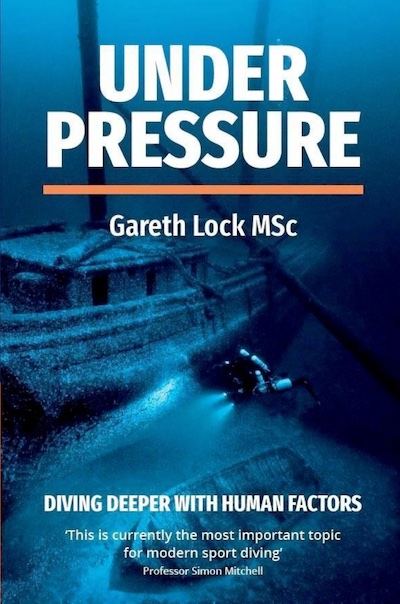Human Factors in Diving

Human factors in diving examines how normal human behavior influences decision-making, situation awareness, and team performance under stress. It explains why choices often feel reasonable at the time they are made and how awareness is gained, narrowed, or lost. Understanding these influences allows divers to recognize problems earlier and intervene before they escalate.
Why Human Factors Matter
Diving environments impose physical and psychological stress. Cold, limited visibility, task loading, time pressure, and social dynamics all compete for a diver’s attention. As stress increases, cognitive bandwidth shrinks. Attention narrows, assumptions replace verification, and subtle warning signs are missed.
Safety in diving is shaped by the interaction of four elements: the environment, equipment, individual performance, and team performance. Human factors influence all four. When incidents occur, they are rarely caused by a single failure. They emerge from a chain of small, understandable decisions that were never corrected.
What Are Human Factors
Human factors are the psychological, cognitive, and social forces that drive how people perceive situations and choose actions. They are not about assigning blame. They explain why a decision felt reasonable given the information, experience, and pressures present at the time.
When divers understand these forces, they stop treating mistakes as personal failings and start identifying the conditions that allowed errors to develop. That shift is what enables earlier detection and more effective intervention.
How Decisions Unravel Underwater
Underwater decision-making often relies on fast, intuitive thinking. This is efficient but error-prone, especially when conditions degrade. Common contributors include:
- Assumptions: believing conditions are stable or a buddy is in position without checking
- Biases: pressing on because the dive was planned or previous dives ended without incident
- Stress: cold, current, or equipment issues shrinking attention and masking cues
- Social pressure: avoiding questions or concerns to keep the group moving
- Mismatched mental models: applying past experience to situations where it no longer fits
These are predictable human responses. Recognizing them early is the first step toward managing them.
Situation Awareness and Capacity
Situation awareness has three parts: noticing what is happening, understanding what it means, and anticipating what will happen next. Newer divers often lose awareness because buoyancy, trim, breathing, and task execution consume most of their attention.
When capacity is fully occupied, awareness contracts. You cannot respond to what you do not notice. Improving awareness requires deliberate habits, including regular instrument checks, active buddy verification, and clear expectations established during the pre-dive briefing.
For a deeper treatment, see the Dive Otter page on situation awareness for divers.
Team Dynamics and Psychological Safety
Strong teams consistently outperform strong individuals. Team performance depends on trust, communication, and the ability to interpret subtle behavioral cues. Social intelligence allows divers to detect hesitation, anxiety, or confusion before those states escalate into problems.
Teams function best when psychological safety is present. Psychological safety means any diver can ask questions, raise concerns, or call a dive without ridicule or penalty. A Just Culture supports this by examining mistakes to understand contributing conditions while still holding divers accountable for reckless choices.
Together, these principles create teams that surface problems early instead of hiding them. See the Dive Otter discussion on calling the dive for how this plays out in real dives.
Normalization of Deviance and the Role of Checklists
When a rule is bent repeatedly without immediate consequences, the deviation begins to feel normal. A diver surfaces several times below the planned gas reserve and nothing goes wrong. Over time, reserves shrink further. Others observe and adopt the same behavior. Risk increases quietly while outcomes appear unchanged.
This drift is difficult to see without structure. It is countered by:
- Using checklists for equipment setup and briefings
- Agreeing on clear procedures and communicating deviations
- Conducting regular debriefs to reset what “normal” should be
Reflection and Structured Debriefing
Most learning occurs after the dive. A structured debrief compares the plan with what actually happened, examines why things went well, identifies areas for improvement, and updates mental models for future dives.
Without reflection, divers repeat the same assumptions and normalize the same shortcuts. Debriefing is not about blame. It is about understanding performance-influencing factors and making deliberate adjustments before the next dive.

Learning More About Human Factors
The leading body of work on human factors in diving comes from The Human Diver, led by Gareth Lock. If you want to go deeper than general safety advice, this is the most practical framework I have found for understanding how divers actually make decisions under pressure. His book Under Pressure and the course Human Factors in Diving: Essentials provide practical tools for improving awareness, decision-making, communication, and team performance.
I completed the Essentials course myself. It remains the most valuable non-skill training I have taken as a diver. It changed how I prepare, how I evaluate my own decisions, and how I dive with others.
As a Human Diver Ambassador Dive Otter sponsors members of the Mid-West Underwater Explorers community who want to enroll in the Essentials course as a way to make this training accessible.
Why This Matters
Human factors are not abstract theory. They describe the real limits of human attention, perception, memory, and behavior underwater. When divers understand those limits, they stop relying on luck and start relying on awareness, communication, and disciplined habits.
The goal is simple: fewer surprises, earlier corrections, and better decisions underwater.